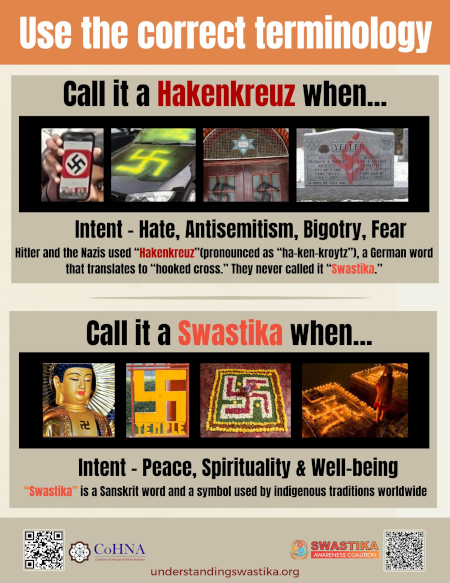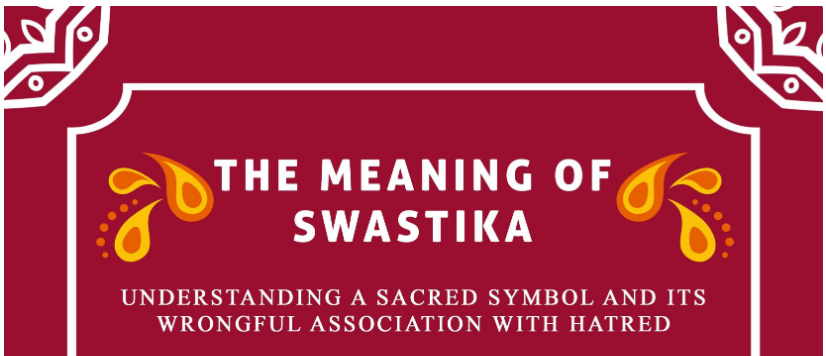More than 70 organizations representing Hindu, Jewish, Muslim, and interfaith communities have signed a coalition letter urging Canadian lawmakers to use accurate terminology and context when referring to the word “Swastika” in new anti-hate measures.
The concern centers on Bill C-9 (Combatting Hate Act), introduced by MP Sean Fraser, and Petition e-6625, tabled by MP Melissa Lantsman, Deputy Leader of the Official Opposition, according to a statement by the Coalition of Hindus of North America (CoHNA) on October 9, 2025.

For several years, Hindu communities in Canada have reported an alarming rise in hate crimes – ranging from repeated vandalism of temples and physical assaults motivated by racism and religious bigotry to an outpouring of online hate speech.
“While we certainly appreciate and support the intent of the Bill,” said Rishabh Saraswat, President of CoHNA Canada, adding “this detail around words is critical, and we ask for a simple fix to ensure Canada can combat hate for all communities while also advancing the cause of accuracy.” He encouraged individual Canadians to share their concerns with lawmakers.
CoHNA warned that, despite good intentions, both measures contain a “critical and dangerous flaw” by conflating the sacred “Swastika” with the Nazi symbol of hate, the “Hakenkreuz.” The group emphasized that if left uncorrected, the proposed laws could inadvertently foster further prejudice and discrimination against Canadian Hindus, Jains, and Buddhists.
The coalition’s signatories include temples, cultural organizations, and spiritual associations representing the breadth of the Hindu community in Canada, with roots stretching from Bangladesh, India, and Nepal to the Caribbean, and supported by several interfaith allies.
While endorsing the overall goal of the legislation, the coalition expressed deep concern over the terminology “Nazi Swastika” and the labeling of the Nazi emblem as the “Swastika” in both measures.
Specifically, Bill C-9 describes the prohibited symbol as “the Nazi Hakenkreuz, also known as the Nazi Swastika.” Though it acknowledges the correct German term, “Hakenkreuz,” it undermines that accuracy by simultaneously legitimizing the mistranslation “Swastika.”
Moreover, the Bill criminalizes any symbol that “so nearly resembles” the banned emblem that it might be “confused” with it – creating a potential legal gray area. Under this language, Canadians displaying a Swastika in their homes, temples, or during cultural festivals could face investigation or prosecution.

Petition e-6625 goes even further, calling to “finally ban the Swastika.” CoHNA argues this phrasing is not only factually wrong but amounts to a legislative attack on a sacred symbol revered by over two billion people worldwide, including millions of Canadians.
Accordingly, CoHNA urged lawmakers to remove all references to the “Swastika” and use the historically accurate term “Nazi Hakenkreuz.”
“This difference is nuanced but critical. Research has shown that Hitler and the Nazis never used the word ‘Swastika,’ calling their hateful symbol the ‘Hakenkreuz,’” noted CoHNA. “Reporting on the rise of Hitler in the 1920s, Western press used the term ‘Hakenkreuz,’ as did the Nazis who published newspapers named for the Hakenkreuz. The new measures can serve to clarify and correct a historical misunderstanding instead of strengthening it.”
Over the past five years, CoHNA and its partners, including the Swastika Awareness Coalition and several Hindu, Buddhist, and Jain groups, have consistently asserted that the term “Nazi Swastika” violates their religious beliefs by mislabeling a sacred and ancient symbol as one associated with hate and genocide, said CoHNA.
“To correct this narrative, police departments in regions like Peel in Ontario and cities like Montreal in Quebec have updated their materials,” CoHNA stated, adding, “Globally, the campaign has succeeded in modifying similar legal measures in the U.S. in states like Virginia and California, as well as in Australian states like Victoria and New South Wales.”






